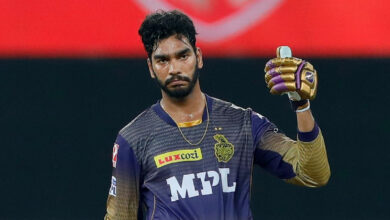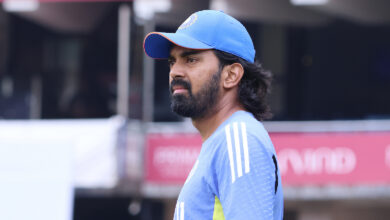Euro 2024: If this is the end of Luka Modric’s international career, it’ll be the most heartbreaking farewell | Football News

One of the more poignant moments on a night full of moving scenes came not on the football field but in a cramped room inside Leipzig’s Red Bull Arena.An Italian journal took the mic and made more of a request to Luka Modric rather than asking him a question in the post-match press conference. “I’d like to ask you,” he began, “to never retire from your playing career because you are one of the finest players I have ever commentated on, thank you.”
His eyes still red from crying after Croatia drew with Italy, a result that all but knocked them out of Euros, Modric at last smiled.
He winked at the journal and replied: “I’d also like to keep playing forever but there probably will come a time when I have to hang up my boots…”
This was a truly beautiful moment in the post-match press conference ❤️#BBCEuros #Euro2024 #CROITA pic.twitter.com/K8VowAgm7m
— BBC Sport (@BBCSport) June 24, 2024
If that time is now, if this is the last time we see Modric in the famous chequered Croatia shirt, there wouldn’t be a more heartbreaking farewell.
Like they have done in tournament football for the last six years, Croatia were coming out on top in a scrappy, stuttering tie. Neither they nor Italy had been particularly good in the group stage finale. But Modric – who else – had been the difference between the two sides.
Croatia had to win this one to progress out of the group, after being outclassed Spain and frustrated Albania. Briefly, when Modric saw his tired-looking penalty saved Gianluigi Donnarumma in a game of few chances, the writing seemed on the wall. But instead of wallowing in self-pity and losing focus, Modric did what Modric does – staying alert and staying in the right position.
Scorer. Leader. Record-breaker.
🇭🇷 Luka Modrić 👏@Vivo_GLOBAL | #EUROPOTM pic.twitter.com/W5cID41gTq
— UEFA EURO 2024 (@EURO2024) June 24, 2024
He asked for the ball when Josip Stanisic marched forward to launch another Croatian attack. Sprinted inside the box when he saw the pass being played wide towards Luka Sucic, sensing a cross might be swung in. His reading was spot on, but the cross found Ante Budimir in front of Modric. Donnarumma saved Budimir’s first shot. The Italian goalkeeper tried to catch the loose ball. But there he was – Modric ready to pounce on the rebound, turning and wrapping his left boot around the ball to put it past Donnarumma.
1-0, Croatia. If it remained like that, the perennial overachievers would once again sneak out of the group and jeopardise Italy’s chances.
Modric sprinted to the corner and collapsed to the ground, his teammates piling on top of him. Beneath that mountain, the goal scorer buried his face in his hands, hiding his tears; relieved that he had made it right seconds after missing the penalty half-a-minute ago.
Then again, what’s 30-something seconds compared to 18-plus years? That’s how long Modric has been rescuing Croatia. That’s how long he’s been defying age with his untiring, relentless scheming in an international career that’s older than some of the tournament’s breakout stars.
The goal made Modric the oldest scorer at Euros at 38 years and 289 days. And at that moment, it also felt like it would put him – and Croatia – on course for another fairytale.
Like the one at the 2018 World Cup, where Modric inspired Croatia to the final – the closest the tiny country of 38.6 lakh people has come to lifting the trophy. Modric’s elegant ways of running the game – relying more on sensibilities, escaping tackles, passing and dribbling – saw Croatia reach the semifinal of the 2022 World Cup, a feat as improbable as them reaching the final four years earlier, and then the final of the 2023 UEFA Nations Cup.
Indeed, none of this translated into a trophy. But that doesn’t mean Modric won’t be counted among football’s immortals. In the decade of complete dominance two individuals, Lionel Messi and Criano Ronaldo, only Modric stood up to them gracefully and consently.
Those Croatian sides never got tired. They’d keep coming at you, outrun you and fight for the scraps. Never pretty, but always effective. And that is the big difference between then and now.
Zlatko Dalic, who has overseen this golden era from the touchline, went with the same midfield of Modric, Mateo Kovacic and Marcelo Brozovic in the three group-stage matches. All three of them are in their 30s, and though Kovacic and Brozovic are much younger than Modric, they couldn’t play two full matches in a row.
Kovacic was subbed off in the 70th minute. A top-class ball carrier and a beautiful passer, the void he left was immediately felt as Croatia began to lose control of the midfield. And when Modric was substituted in the 81st minute, it felt like Croatia were happy to hold on to the slender lead they had.
The change in mindset allowed Italy, poor in almost all areas until then, to impose themselves for the first time in the match. And with his team’s fate no longer in his control, Modric began biting his t-shirt in the dugout, anxiously waiting for the final whle to blow.
The referee had already glanced at his watch when Riccardo Calafiori slalomed down the midfield, dragging Croatian midfielders towards him and opening up space for Mattia Zaccagni on the left. Calafiori slipped a pass towards his teammate, who cut into the box, dropped a shoulder and curled a stunning shot into the top right corner.
Like the goal he scored, Modric broke down after Zaccagni’s goal too. For it meant that Croatia, with just two points in three games, are all but out of the Euros. Around him, the 25,000 Croatian fans inside the stadium were stunned into silence and his teammates collapsed to the ground.
“I don’t know what to tell you,” Modric would later say “Football sometimes is cruel.”
It indeed is, especially if a glorious international career ends in such cruellest ways.







